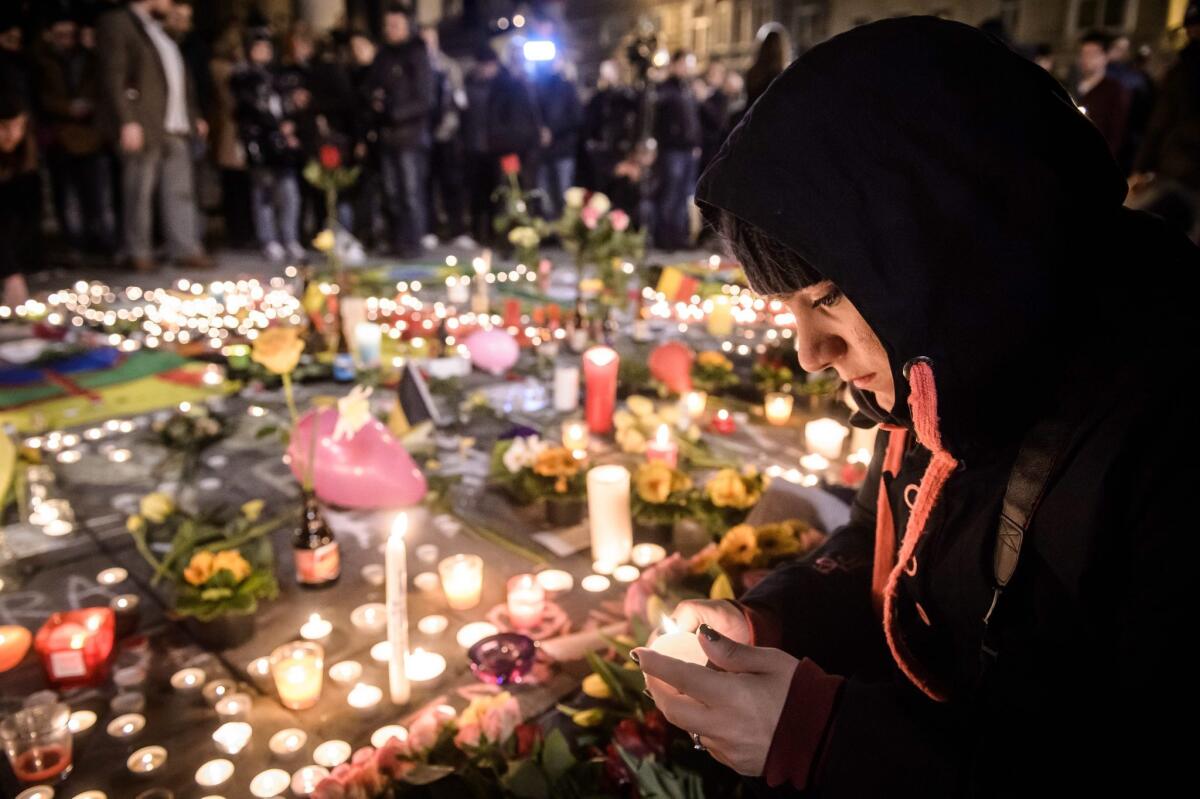Op-Ed: Did the capture of a terrorist in Brussels prompt the attacks?

People gather and light candles at the Place de la Bourse during a vigil to pay tribute to the victims of the attacks in Brussels, Belgium on March 22.
- Share via
Tuesday’s terrorist attacks in Brussels raise two key questions: Were they related to Salah Abdeslam’s arrest last week and, if so, how?
It seems unlikely that the attacks were revenge for the capture of Abdeslam, the top suspect in last year’s Paris attacks, because not only was he a relative nonentity in Islamic State circles but also a symbolic liability to the brand: Here is a man who reportedly walked away from a martyrdom operation, leaving his colleagues to do all the dirty work, so to speak. In other words, he isn’t someone whom any other militant is likely to have sacrificed himself for. In fact, it is probable that, after Abdeslam’s arrest, he would have been regarded as a threat to the wider network of terrorists in Belgium.
The nature and scope of his relationship with this network are unclear, but without it or the wider criminal milieu in which it is intricately embedded, Abdeslam wouldn’t have been able to evade capture for so long. When he was captured, police found stockpiles of weapons at the flat where he was hiding.
Speaking of the arrest, Belgian Foreign Minister Didier Reynders said that Abdeslam “was ready to restart something in Brussels … because we have found a lot of weapons, heavy weapons, in the first investigations and we have found a new network around him in Brussels.” “For the moment,” he said, “we have found more than 30 people involved in the terrorist attacks in Paris, but we are sure there are others.”
According to Shiraz Maher, a senior research fellow at the International Center for the Study of Radicalization in London, the Brussels attack “suggests the existence of a broad terrorist network … already primed and ready to attack, long before police caught up with Abdeslam.” This seems plausible. But it’s also plausible that its “mobilization” Tuesday was directly related to Abdeslam’s arrest. In fact, it may well have been the impetus for it, pushing the network to expedite its plans in order to preempt any heat from investigators, law enforcement and intelligence agencies, with whom Abdeslam has apparently been cooperating.
It is possible that rather than scattering or shutting down the [terrorist] cell with which Abdeslam was associated, his capture accelerated the [attack].
Abdeslam’s network may have decided it had a choice: Either attack at a time of its own choosing, or wait for a climactic showdown with the security forces, where the costs to civilian life would be limited. The network’s leaders seemingly chose the first option, perhaps reasoning that it would generate greater publicity, and greater torment and pain.
On the evening of Abdeslam capture, Belgian Prime Minister Charles Michel announced, “Tonight, we are celebrating a victory.” Belgian Interior Minister Jan Jambon echoed this. “I think it’s a big blow, because [Abdeslam] is one of the most wanted foreign fighters in Europe,” he told CNN. Belgian security chief Jaak Raes was similarly sanguine, telling VTM News on the same day that it was “of the utmost importance that Abdeslam was captured alive, because we can now try to reconstruct the entire scenario … [and] learn lessons from the information that is gleaned.”
Siobhan O’Grady, in a Foreign Policy article titled “Capture of a Paris Ringleader Could Lead to Intelligence Bonanza,” paraphrased Patrick Skinner, a former CIA case officer and director of special projects at a security-intelligence firm in New York: “The priority in the immediate aftermath of [Abdeslam’s] arrest will be finding out what the Islamic State has planned next.”
Skinner also told her that the “downside to Abdeslam’s dramatic capture … is that other members of the militant’s cell would have immediately heard about it and will now ‘try to scatter or shut down.’”
No one yet knows exactly who perpetrated the attacks, how they did it, or why. But it is possible that rather than scattering or shutting down the cell with which Abdeslam was associated, his capture accelerated the violent denouement the cell had long been planning. It is a common argument on the left that killing terrorists is counterproductive, serving to further radicalize the communities in whose name they proclaim to act. But it now seems that capturing terrorists may also have dark, unintended consequences, dangerously raising the stakes for those in the wider terrorist network and for their potential victims.
Simon Cottee is a senior lecturer in criminology at the University of Kent in Britain and the author of “The Apostates: When Muslims Leave Islam.”
Follow the Opinion section on Twitter @latimesopinion and Facebook
MORE FROM THE OPINION SECTION:
Ignore Cruz and Trump — scapegoating Muslims is an un-American response to the Brussels attacks
Believe it or not, Donald Trump is right on neutrality in the Israeli-Palestinian conflict
Nominating Donald Trump will end the Republican Party as we know it. So will not nominating him
More to Read
A cure for the common opinion
Get thought-provoking perspectives with our weekly newsletter.
You may occasionally receive promotional content from the Los Angeles Times.










